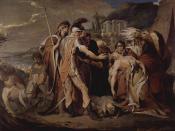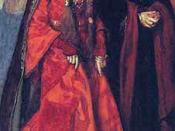A Comparison of Cordelia and Edgar in King Lear
In order to make his own work more interesting, Shakespeare uses literary techniques that keep the reader attentive and 'on the edge'. One expedient that Shakespeare uses to keep his readers' attention is using characters that sharply contrast each other. In King Lear two characters that sharply contrast are Edgar, Gloucester's legitimate son, and Edmund, Gloucester's illegitimate son. These two characters are extremely opposite in nature. In addition to using contrasting characters to keep his readers' attention, Shakespeare also creates characters that parallel each other throughout the play. One definite pair of characters that parallel each other is Cordelia, Lear's only devoted daughter, and Edgar who has already been introduced. Both of these characters go through similar situations. Edgar and Cordelia parallel each other: each loses their family bonds with their fathers (through no fault of their own), they both have unnatural bonds with their siblings, and both are rejoined with their fathers by the end of the play.
These two characters never physically meet, but they are victimized in the play because they are characteristically similar.
After Act I Cordelia and Edgar both lose a bond with their fathers. When King Lear asks his daughters to express their love for him in exchange for their dowry Cordelia simply tells him that she loves him because he is her father, nothing more, nothing less. Compared to her sisters' prolonged proclamations of love for Lear Codelia's was curt. The king takes her expression offensively and vehemently rebukes Cordelia: " With my two daughter's dowers digest the third. / Let pride, which she calls plainness, marry her." (1.1.144-5) The king fervently believes Cordelia acted against him so he disowns her for embarrassing him and letting him down: "Though hast her France. Let her...


